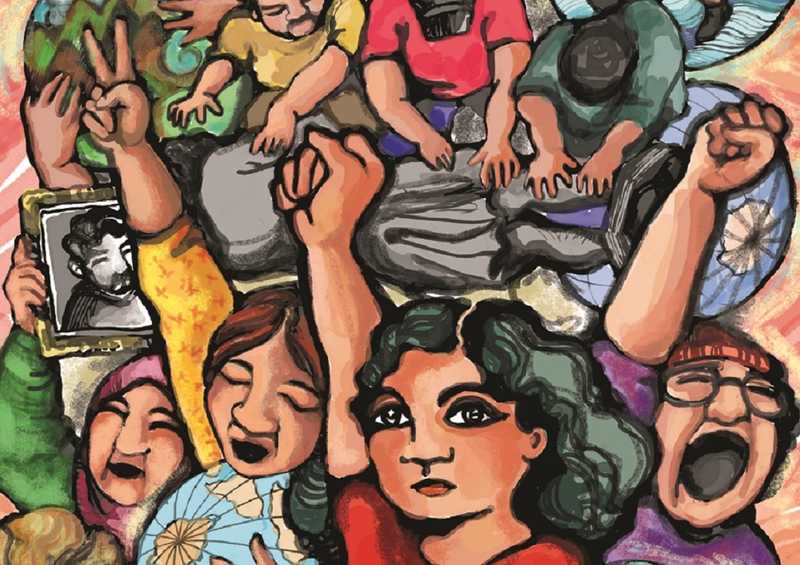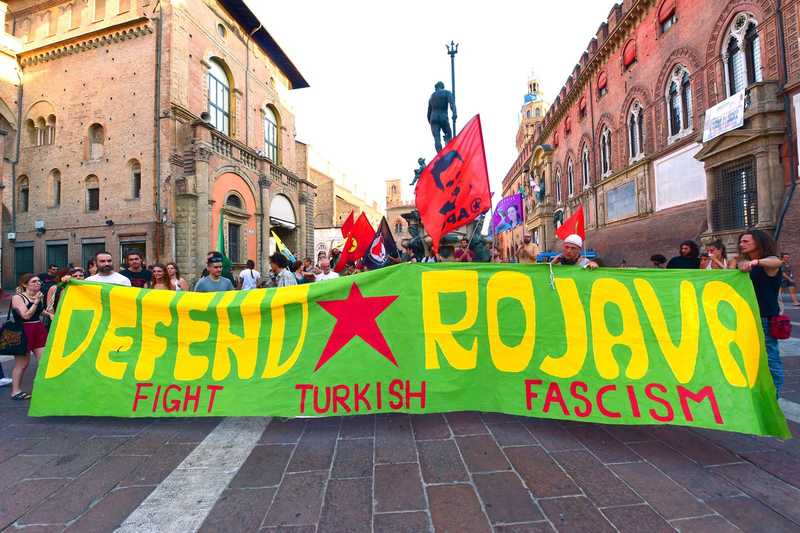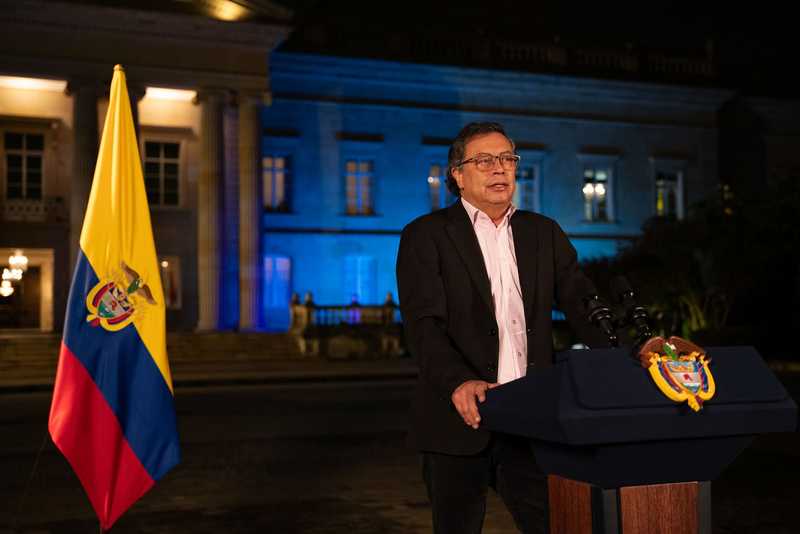
The following declaration is co-written and endorsed by various artists and cultural workers from across the world, each of whom invested in the cultural heritage and contemporary importance of art and culture in internationalist struggles. If you want to get involved with the Art of Internationalism, please write to [email protected].
The Past, the Future, Art, and Us in Between
In support of shared struggles for equality, social and ecological justice, Art of Internationalism builds from a place-based understanding of the world: one grounded in situated histories, rooted in communities and lands and intimately connected across geographies. Art of Internationalism stands both for the craft of organizing transnational, planetary solidarities, while emphasizing the critical role of internationalist art and culture that helps shape our common struggles and desires.
Internationalism—in history and today—defends art and culture as part of common ownership in shared governance and care, because it contributes to our collective imagination of equality, social and ecological justice. To transform the world, change needs to be imagined and given form, touch, sound, taste, feel, and time. Internationalist art and culture provoke the desire for material change to ensure egalitarian forms of life. It is part of the cultural, economic, and political transformation that the world desperately needs.
In the system of globalized capitalism, the most visible artworks have turned into stocks or assets and the most commercially successful artists have become companies. For the one percent, art has become a reliable investment opportunity with attractive tax benefits attached. We, as peoples, can access some of these artworks in nominally public museums and galleries, but the majority of us are largely disenfranchised from the art hoarded in the freeports and private palaces of the ultra-rich.
The accumulated art and culture of one-tenth of the one percent is part of their world, not ours. The art and culture of the world we want are internationalist, popular, and communal. It is the material culture of our social movements, the counter-power language that holds us together as an insistent, pluralist “we.” It is an art that builds on our shared struggles to shape new planetary solidarities and popular power. Not just to affirm who we are, but to imagine the communities we are yet to become.
Internationalist art and culture emerge in and through internationalist struggles, each of which is specific to a place and time. In each of these movements, artists and cultural workers play a role to help imagine the transformation of our societies, whether this concerns Indigenous self-determination, socialist revolutions, anti-colonial uprisings, civil rights and Black liberation, working-class unionization, anti-fascist, anti-racist, and anti-imperialist resistance, feminisms, LGBTQIA+ movements, stateless nations, undocumented migrants and refugees organizations, disability rights, and climate justice. While each of these struggles is particular to its context, a specific change achieved through any of them is simultaneously a change for the world.
Art and culture have always been part of popular efforts to make visible the injustices of the past and present and shape new and just futures. This is the trajectory of radical artistic and cultural imagination to which the Art of Internationalism platform is aligned, and through which we aim to create our own forms of internationalist art and culture, as well as their infrastructures for art-making, cultural distribution, and generous exchange.
The capability to make visible injustices and imagine our worlds anew belongs to every single one of us. It contributes to and strengthens our sense of belonging and critical engagement with the realities we inhabit while connecting communities across the world in common purpose. Internationalist art and culture do not only contribute to shaping this counter-power in our past and present, but also help us to imagine the communities we are yet to become through the many worlds of international, transnational, planetary, terrestrial, commonist, and cosmopolitical solidarity we create together.
Art of Internationalism in Practice
We aim for the Art of Internationalism platform to:
1. Make Art Communal
Imagination belongs to all. Artists and cultural workers develop specific competences that must be recognized, but the emancipatory experience and joy of making art, music, and theater must be accessible to everyone. It is critical to remove barriers of any kind to access common artistic and cultural heritage, as well as to partake in its creation, for these are commons that are defined collectively. We therefore aim to develop communal art and culture that re-imagine twenty-first-century internationalism in the form of (digital or analogue) symbols, posters, videos, publications, and public projects and manifestations, which can be accessed or shared, studied and experienced for free. Our art and culture desire to travel as far and wide as our solidarities and that means we will initiate and support generous forms of on- and offline distributive public culture.
2. Support PI Member and Allied Campaigns
Art and culture are part of all struggles. To create change we must imagine change first. Therefore, artists and cultural workers who are involved in, aligned to, and inspired by popular movements for equality, social and ecological justice are essential to their success. Internationalist art and culture build on the collective creativity of popular movements and we aim to contribute critical and solidary artistic and cultural work in relation to the progressive political parties, unions, Indigenous organizations, and social movements that are part of the Progressive International, as well as their allies.
3. Explore Pedagogies of Internationalist Art and Culture
We aim to learn from and contribute to the long histories of art and culture of Indigenous peoples and stateless nations, in anti-colonial and socialist revolutions, civil rights and Black liberation, anti-racist, working-class, feminist, LGBTQIA+, refugee rights, disability, and ecological movements to create new, pluralist narratives of internationalist art and culture. Different from the Eurocentric trajectories of art, which have been centered on the individual, modern, white, male genius, we seek to explore and experiment with leaderful pedagogies of mutual education and intersectional narration.
4. Ally Progressive Communal Institutions
Many museums, theaters, and cultural centers suffer from authoritarian and neoliberal pressures from governments and corporations. We call on progressive actors within existing institutions to work with us to support the creation, circulation, research, and education of internationalist art and culture. Through this work, we aim to develop an internationalist infrastructure of art and culture under communal ownership, governance, and care.
5. Abolish Cultural Racism, Patriarchy and Fascism
Imperialism, colonialism, fascism, and its racist and patriarchal narratives have attempted to erase the cultural and artistic contributions of Indigenous, Black and peoples of color, the working class, womxn, the LGBTQIA+ community, stateless nations, refugees and the undocumented, and differently abled people. We commit to the project of decolonization and anti-fascist struggle in our platform and cultural institutions at large by calling for a structural redistribution of power, colonial reparations, and quota to enforce equal representation and agency. We reject the manufactured supremacy of western art history, and acknowledge and build on the heritage of pluralist anti-colonial and anti-capitalist histories of art and culture as they have erupted in popular struggles the world over. We resist the instrumentalization of art and culture for authoritarian purposes of any kind.
6. Defend the Rights of Cultural Workers
Art and culture take work. Artists and cultural workers contribute to cultural commons and generate social values. Their work must be recognized as such, paid for, and artists deserve the same social benefits as any other members of society. We invite organizational bodies of cultural workers to join the Art of Internationalism platform to make a common front for proper pay and social security, including parental leave and retirement.
7. Sustain Social Movements
We invite artists and cultural workers to contribute in order to support member organizations of the Progressive International and our allies. While we aim for a future of art that is not market-based, in situations of urgency, we will organize fundraisers as they can be a way to divert existing resources to provide essential resources and oxygen to our aims and ideals.
Just as internationalist art and culture contribute to imagining and shaping many worlds past, present, and future, so will this declaration of principles and practices continuously transform as the community of artists and cultural workers in the Art of Internationalism platform grows. This text will therefore be revisited and revised when needed, but at least on a bi-annual basis.
---
Moussa Ag Assarid is a writer, storyteller, journalist and activist born in the Sahara between Timbuktu and Gao. He wrote various books, amongst which Children of the Sand: A Tuareg School (2008), and is currently developing solar energy resources in Northern Africa. As a political activist, Ag Assarid is involved with coalitions of Kel Tamasheq (Tuareg), Songhai, Fula, and Arab peoples to increase political rights in the Sahara and Sahel region (Azawad).
Zdenka Badovinac is a curator and writer. From 1993 to 2020, she has been the Director of the Moderna galerija in Ljubljana (MG+MSUM). Her most recent book is Comradeship: Curating, Art, and Politics in Post-Socialist Europe (Independent Curators International (ICI), New York, 2019. Badovinac is a founding member of the museum confederation L’Internationale.
Libia Castro (Spain) and Ólafur Ólafsson (Iceland) started to work together in 1997. They are based in Rotterdam and stay and work regularly in Reykjavik and Málaga. They are collaborative and multidisciplinary artists, whose practice is informal, critical and socio-politically engaged. They have joined activist groups and invited other artists, other professionals and people of all walks of life to work in tandem with art and activism.
Chto Delat (What is to be Done?) collective was founded in early 2003 in St. Petersburg by a workgroup of artists, critics, philosophers, and writers with the goal of merging political theory, art, and activism.
The Concerned Artists of the Philippines (CAP) is a Filipino artists and cultural workers’ organization committed to advancing freedom of expression and the people’s movement for justice, nationalism, and democracy. It was co-founded in 1983 by Lino Brocka, National Artist for Cinema.
Disarming Design from Palestine is a thought-provoking design platform for the development and presentation of contemporary design from Palestine, spreading alternative narratives about life under occupation and investing in creative practices as forms of resistance and resilience.
Charles Esche is a curator and writer, member of the Democracy in Europe Movement 2025 (DiEM25) and director of the Van Abbemuseum in Eindhoven. Van Abbemuseum is a member of the European network called L'Internationale, a co-operation with six European institutions.
Etcétera is a multi-disciplinary collective created in Buenos Aires in 1997. In 2005, together with other artists and activists, they were part of the foundation of the International Errorist Movement, an organization that claims error as a philosophy of life.
iLiana Fokianaki is a writer and curator based in Athens and Rotterdam and the director of State of Concept, the first contemporary art institution of Athens, that promotes socially and politically engaged practice by Greek and international artists and cultural workers.
Varsha Gandikota-Nellutla is feminist activist from Hyderabad, India. She is the coordinator of Blueprint, the policy platform of Progressive International (PI), and a member of the Cabinet, the executive body of PI.
Paweł Wargan is the Coordinator of the Secretariat of the Progressive International, the body responsible for carrying out the day-to-day activities of the organization. Originally from Gdańsk, Poland, he is now based between Berlin, Germany, and Moscow, Russia.
Quinsy Gario is a visual and performance artist and poet born in Curaçao and raised in St. Maarten, currently working in the Netherlands. He focuses on decolonial remembering and the actions that remembering can engender. His most well-known work, Zwarte Piet Is Racisme (2011–2012), critiqued the general knowledge surrounding the racist Dutch figure and practice of “Zwarte Piet” (Black Pete).
Paul Goodwin is a curator, researcher, and urban theorist based in London. Goodwin’s research and curatorial interests span the fields of transnational art, urbanism, and curatorial practice with a focus on African diaspora art and visual cultures. Professor Goodwin is Chair of Contemporary Art & Urbanism and Director of TrAIN (Transnational Art, Identity & Nation) Research Centre at University of the Arts London.
Diyar Hesso is a filmmaker, teacher, producer, organizer, revolutionary film theorist and co-founder of the Rojava Film Commune, in the autonomous Rojava region, West-Kurdistan (North-Syria). He is producer of The End Will be Spectacular (Ersin Çelik dir., 2019) and director of photography of Stories of Destroyed Cities (Sêro Hindê, 2016).
Maria Hlavajova, a founding General and Artistic Director of BAK, basis voor actuele kunst, Utrecht, since 2000. In 2008–2016 she was Research and Artistic Director of FORMER WEST. Hlavajova has instigated and (co-)organized numerous projects at BAK and beyond, including the series Propositions for Non-Fascist Living (2017–ongoing), Future Vocabularies (2014–2017), and New World Academy (with artist Jonas Staal, 2013–2016).
María Inés Plaza Lazo is a writer, art critic and curator, founder and editor of Arts of the Working Class. She is also founder of L’Union des Refusés, an anti-bureaucratic global organization based in The Hologram (Cassie Thornton, 2020), an interchanging model of collective work inspired in Greek Solidarity Clinics to help (art) workers to convert the art world into a mutual care system. She lives and works between Berlin and Guayaquil, Ecuador.
Lisa Ito is a writer, curator, and cultural worker. She is the Secretary-General of the Concerned Artists of the Philippines (CAP), an organization of progressive artists and cultural workers based in the Philippines.
Komîna fîlm a Rojava (Rojava Film Commune) is a cultural association founded in 2015 by local and international filmmakers under the umbrella of the Rojava revolution. The commune creates and screens films, supports local filmmakers, and trains new talents to bring back the culture of cinema to the region.
Sven Lütticken teaches art history at the Vrije Universiteit in Amsterdam and theory at Dutch Art Institute. He is the author of Secret Publicity: Essays on Contemporary Art (2006), Idols of the Market: Modern Iconoclasm and the Fundamentalist Spectacle (2009), History in Motion: Time in the Age of the Moving Image (2013), and Cultural Revolution: Aesthetic Practice after Autonomy (2017).
MARCH is an international journal of art & strategy founded by Sarrita Hunn and James McAnally and published by The Luminary (St. Louis, MO US). MARCH embraces publishing as an act of protest to address the critical social and political issues of our time.
Golrokh Nafisi is an illustrator, animator, and puppet maker experimenting with performances in public space. Nafisi works through bodies and ideologies to imagine and shape new works as forms of collective action.
Not An Alternative is a collective that works at the intersection of art, activism and theory. It has a mission to affect popular understandings of events, symbols, institutions, and history. Through engaged critical research and design, the group curates and produces interventions in material and immaterial space, bringing together tools from art, architecture, exhibition design, and political organizing.
Ahmet Öğüt lives and works in Amsterdam and Istanbul. As a sociocultural initiator and transversal artist, Öğüt consistently seeks out collaborators from outside of the art world, finding unique ways to grapple with complex social issues ranging from migration to civil unrest.
Gabriel Silveira is a Brazilian creative director and writer based in Barcelona and a founder of Contra, a strategy-driven creative agency focused on helping social and political movements.
Kuba Szreder is an interdependent curator, author, and lecturer who lives in Warsaw. Szreder cooperates with consortia of postartists and engages in art workers’ struggles.
Jonas Staal is an artist based in Rotterdam and Athens whose work deals with the relationship between art, democracy and propaganda. He is the founder of the New World Summit and works with various political organizations, such as DiEM25 and the autonomous Rojava government.
The Anti-Fascist Year in Poland is a country-wide initiative promoted by a coalition of public institutions, NGOs, social movements, art collectives, artists, and activists. Its goal is to commemorate all anti-fascist activists, who actively resisted fascism in the past, and to oppose the reoccurrence in the public domain of neo-fascist and neo-Nazi movements as well as of any and all parties endorsing and idolizing fascist ideas, discourse, and practices.
We Sell Reality is an open-source collective of undocumented and documented social designers that creates products, installations and public interventions with the aim of providing insight into the lives of undocumented refugees and in search of practical solutions that can improve the living conditions of refugees in limbo.
What, How & for Whom/WHW is a curatorial collective formed in 1999 and based in Zagreb, Berlin and Vienna. Its members are Ivet Ćurlin, Ana Dević, Nataša Ilić, and Sabina Sabolović, and designer and publicist Dejan Kršić.
Didem Pekün combines research and practice. In her essay films, she addresses how violence and displacement define and destroy life. A founding member of the Center for Spatial Justice (MAD), Istanbul, she holds a PhD in Visual Cultures from Goldsmiths, and is currently a fellow at Graduate School / Berlin Center for the Advanced Studies in Arts and Sciences @ UdK, Berlin.
Shela Sheikh teaches at Goldsmiths, University of London, London, where she convenes the MA Postcolonial Culture and Global Policy and the PhD Cultural Studies programs. Her current research focuses on colonialism, botany, and the politics of planting.




